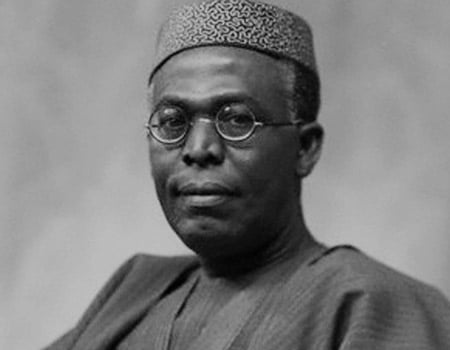When Philip Emeagwali—celebrated computer scientist—alongside others set out to identify, hail and categorise 100 greatest Africans of all time, living and dead, the list threw up the ilk of South Africa’s Nelson Mandela, Martin Luther King Jr, W.E.B. Dubois and Leopold Senghor. Prominently penciled in his place of earned honour in Emeagwali’s list is Nigeria’s foremost nationalist and statesman, Chief Jeremiah Oyeniyi Obafemi Awolowo.
Enigmatic, quintessential and populist in temperament, Chief Awolowo occupied—and still does—a most admirable dais in Nigeria’s history. Today, March 6, marks Chief Awolowo’s 108th birth anniversary. After his earthly passage on May 9, 1987, 30 years ago, Chief Awolowo’s accomplishments have remained a most prized reference for leadership and governance.
Very few personalities, like Chief Awolowo, still hold such persuasive and binding influence on human history, years after their deaths. Chief Awolowo’s life today as it did years ago serves as a template of moral rectitude void of any questionable ambivalence or vacillations.
Indeed, like all would argue, the indomitable Awolowo lived ahead his time. Doménikos Theotokópoulos, widely recognised as El Greco considering his Greek background, was a sculptor, an architect, and a painter. El Greco lived during the Spanish Renaissance and was born in 1541. Today his work is held in awe. He is regarded as a painter who was ahead of his time, considering certain artistic techniqueswhich he employed. Today many don’t believe El Greco can be cocooned in one school of art. Chief Awolowo, like El Greco, created his own parameters of appraisal.
Unarguably, Nelson Mandela remains one of Africa’s living legends. Like Mandela, Chief Awolowo has metamorphosed into the symbol of Nigeria’s democratic ideals. Ghana’s Kwame Nkrumah contributed immensely to the popularisation of his people’s freedom. Like him, Chief Awolowo not only foresaw the necessity of a united whole of the Nigerian entity but provided the needed blueprint for its actualisation and retainment.
Tanzania’s Julius Nyerere was cast in the mold of Chief Awolowo when he disdained the corrupting influence of power. Chief Awolowo provided the needed template for regional development and national cohesion when he held sway as Premier of Nigeria’s South West Region. Today, the region chiefly occupies a pacesetter platform compared to other regions of the federation. No other Nigerian, dead or alive, has received the national honour of Grand Commander of the Federal Republic (GCFR) without serving as president or Head of State, safe Chief Awolowo. Nothing else could have qualified the peerless Chief Awolowo but his saintly sense of integrity, his populist, largely anti-elitist nationalistic orientation, an unrivalled, positively infectious commitment to the ideals of democracy and rule of law. An ideologue, he adhered to the strictest avowals of true federalism which are still widely celebrated within and outside the realms of Nigeria till date.
The depth of his intellectual outlook on Nigeria politics and the Nigeria state has remained one of the ever-abiding stencils in the nation’s political landscape. Besides, the stretch of his administrative competence has foregrounded both local and international discourses on management, leadership and governance as observed today at the sage’s memorial lecture holding at the Nigerian Institute of International Affairs, Victoria Island, Lagos.
Path to Nigerian Freedom; Awo – Autobiography of Chief Obafemi Awolowo; My Early Life; Thoughts on the Nigerian Constitution; The People’s Republic; The Strategy & Tactics of the People’s Republic of Nigeria; The Problems of Africa – The Need for Ideological Appraisal; Awo on the Nigerian Civil War; Path to Nigerian Greatness; Voice of Reason; Voice of Courage; Voice of Wisdom; Adventures in Power – Book 1 – My March Through Prison; Adventures in Power – Book 2 – Travails of Democracy are some of the resourcefully practicable intellections of Chief Awolowo.
Some of the eloquent testaments of his deep reflections are captured in some of his quotes:
“Nigeria is not a nation. It is a mere geographical expression. There are no ‘Nigerians’ in the same sense as there are ‘English,’ ‘Welsh,’ or ‘French.’ The word ‘Nigerian’ is merely a distinctive appellation to distinguish those who live within the boundaries of Nigeria and those who do not.”
“After rain comes sunshine; after darkness comes the glorious dawn. There is no sorrow without its alloy of joy; there is no joy without its admixture of sorrow. Behind the ugly terrible mask of misfortune lies the beautiful soothing countenance of prosperity. So, tear the mask!”
“Violence never settles anything right: apart from injuring your own soul, it injures the best cause. It lingers on long after the object of hate has disappeared from the scene to plague the lives of those who have employed it against their foes.”
“Those of us placed in a position of leadership must be prepared to grasp the nettle if we unite in doing so, and if, in addition, we set a worthy example in probity, unselfishness, and self-sacrifice, the people will follow, all too readily, in our footsteps.”
“All is fair in war, and starvation is one of the weapons of war. I don’t see why we should feed our enemies fat in order for them to fight harder.”
“It is safer and wiser to cure unhealthy rivalry than to suppress it.”
In a reflection on the personality of Chief Awolowo, former Head of State, General Yakubu Gowon under whom Chief Awolowo served, stated, “And let me say this: Because he (Awolowo) is an Ijebu man, I know how frugal he is with money. I say that with regret because it got to the time when the vote for looking after me in the State House got exhausted and this was all for some of the entertainment I do to members of (ruling) council when they come to meeting and to have breakfast or launch, refreshment and so on, a lot of it went there. Not only for my own feeding, which would have been sufficient, but this we did not take into consideration in asking for the votes. And when the money finished and we requested for more money, the old man (Awolowo) said ‘No, there is no vote. You expended your votes and you should not have done that.’ I told him: ‘It is because of the feeding I am feeding you.’ And of course, he would not have anything. He would only have his bottle of water and may not take anything at all.
“So we had to beg him for me to be able to survive as head of state. When it comes to that, I can assure you he was very frugal and very, very careful with finances. And we had to live within our means. Every kobo was accounted for. And he(Awolowo) really kept a meticulous attention to details as far as finances were concerned. And he would not brook any break from the correct procedure as far as our finance was concerned. And as a result of that, we were able to carry out little developments that we could carry out at that time.”
Today, as family, friends, associates and followers of Chief Obafemi Awolowo celebrate his 30th posthumous birthday, all of the sage’s contributions to human emancipation, especially of Africa’s most populous black nation, remain essentially relevant and immortalise the personhood of Chief Obafemi Awolowo.
Awo’s posthumous birthday holds today
The posthumous birthday of Chief Obafemi Awolowo holds today.
The event, which will start with a memorial service at the family chapel of the Awolowos in Ikenne-Remo, Ogun State at 8.30 a.m. will also feature a memorial lecture entitled: “The Awolowo legacy and its message to Nigerian youths,” organised by the Obafemi Awolowo Foundation.
Friends and political associates will join the family in celebrating the icon with the memorial lecture which will hold at the Nigerian Institute of International Affairs, Victoria Island, Lagos, at 11.00 a.m.
Professor Banji Akintoye will be the guest lecturer, while former head of state, General Yakubu Gowon, will be the chairman on the occasion.
The sage, Chief Awolowo, was born on 6 March, 1909. He lived a fulfilled life as a father, lawyer, politician and nationalist and left legacies that forever marked him out as unequalled among his contemporaries. He transited to eternal glory on May 9, 1987.
Papa Awo remains the only Nigerian to have received the national honour of Grand Commander of the Federal Republic (GCFR) without serving as president or Head of State, with his remarkable integrity, ardent nationalism and commitment to the ideals of democracy, rule of law and true federalism still widely celebrated till date.
Papa Awolowo’s political influence and ideology-based politics have continued to remain popular across the country.






